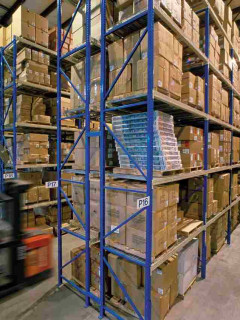As a warehouse manager, you know that your role is not just to manage supplies, warehousing or the transport of goods. It’s much more than just managing products: you’re also managing people, on a day-to-day basis, to keep your business running smoothly.
And over the years, logistics management has become increasingly complex. New working habits, new expectations of the professional world, new tools: changes in the business world have brought with them changes in people.
To help you meet the challenges of today’s logistics management, we’ve put together five keys to successfully managing your warehouse teams.
What are the major challenges facing logistics management today?
Management in the warehouse is an absolutely crucial logistics function – and probably even more so today, when the challenges facing the transport and logistics functions are many.
First of all, today’s logistics manager has to ensure that logistics operations run smoothly throughout the supply chain, in particular by limiting the error rate in the warehouse. With the need to speed up the supply chain, errors relating to procurement, storage, order preparation, transport or routing can be all the more frequent. They also have a greater impact on a company’s business and competitiveness, with end customers paying even more attention to the quality of the service they receive.
But logistics management also faces a major challenge: motivating its teams to improve performance and reduce order preparation times. This is a key role in a world where end customers expect goods to be delivered even faster than before.
Finally, the last major challenge for the logistics manager is toensure well-being in the warehouse, by looking after the safety of employees as well as their Quality of Life at work. This work is crucial to limiting absenteeism and staff turnover in the warehouse, in jobs that are extremely arduous and that have been suffering from recruitment difficulties for years now.
As you can see, more than managing the flow of goods and the management of stocks, it is the management of people that is central to logistics management today. And to meet these challenges successfully, you need to think about the best management techniques.
5 keys to meeting today’s logistics management challenges
Ready to improve your skills in logistics and transport management?
Here are the five things you need to do to manage your warehouse teams more effectively.
1. Implement a benevolent management style
Gone are the days of paternalistic management in logistics warehouses, where the manager is simply an order giver! With today’s employees and service providers, you need to show empathy and kindness if you want to successfully manage your team and motivate them on a daily basis.
So take care to establish a genuine “open door” policy, which allows you to welcome problems raised by your employees. Repeat frequently to your teams that they are free to suggest ways of optimising their work – and make it clear that you will take them into account afterwards! You need to back up your words with action.
What’s more, make sure you’re an active listener. This is a quality that consists of listening not only to the verbal language of your employees, but also to their paraverbals and all the elements that may indicate that they are encountering problems in the warehouse. In short, it’s a question of knowing how to detect concerns without your employees even telling you about them, so that you can raise the subject with them in a friendly manner.
2. Empower your teams
This is probably the most important key to saving time in your responsibilities as logistics manager, but also to winning the loyalty of today’s employees, who are looking for more and more autonomy in the professional world.
Of course, to do this, you need to rely on competent employees. But you also need to know how to delegate tasks to them – even those that fall more within the scope of your supply chain management strategy (of course, always under your benevolent supervision from the outset).
And in the future, we can imagine that certain technologies, such as automation and robotisation, will eventually give operators more autonomy. They will make logistics jobs even less arduous, and operators will have even more technical profiles, making them more autonomous in relation to these new technologies.
3. Take account of employees’ career development expectations
As a logistics manager or team leader, you probably already know that today’s employees won’t stay with a company that doesn’t offer them a medium-term career development horizon. Your logistics management must therefore take a close interest in this, from the moment a new recruit joins the team.
To find out what your operators want from their jobs, use the discussions you have with them on a daily basis, as well as their annual appraisal interviews. These are of course used to set the objectives for the employee’s current position for the coming period. But it’s also an ideal time to discuss the actions needed to enable the operator to achieve his or her individual career goals, and possible career opportunities within your company.
And, to support their career development in the logistics sector, think about putting in place a real skills development plan for those who want it. This plan should include training, skills assessments and coaching, depending on the needs identified in advance.
4. Create a group spirit
The work of a logistician in a warehouse can seem lonely, especially when each operator is dedicated to a specific job (picking, packing, handling, etc.). Hence the importance of creating real team cohesion!
There are several ways of doing this:
- Set uprituals. Team meetings, such as stand-ups at the start of shifts, need to be structured in such a way that they involve and motivate everyone.
- Take care when welcoming new operators. Prepare a real onboarding programme for them, with an induction course that allows them to discover not only their job but also the whole team, and the impact of their role on the rest of the warehouse.
- Deploy a mentoring or peer learning programme. The idea is to increase the skills of the whole team on specific subjects, and to reward those who have specific expertise. For example, when an operator comes back from a training course, why not ask him to give a summary of the best practices he has learned during a team meeting?
- Favour informal moments. Afterworks and other team lunches help to create a good atmosphere among colleagues.
5. Make operator safety a priority at all times
This last piece of advice may seem trivial, but it is probably the most important role of logistics management: to protect your teams at all times. The jobs in this sector are arduous, and they are fraught with danger for your operators’ bodies and minds.
Your role is therefore to :
- Deploy equipment that limits the arduousness of their work. A good deal of equipment, such as anti-fatigue mats or wrapping machines, can help limit the risk of Musculoskeletal Disorders in the warehouse. To find out more, see our keys to preventing Musculoskeletal Disorders in the warehouse.
- Offer your operators training in well-being techniques. Training in appropriate gestures and postures, or training in muscular awakening, will ensure that your teams are well equipped to preserve their health at work.
Apply these key management principles to your logistics organisation today, and you’ll soon see the results: your operators will be more motivated, your warehouse more productive, and your supply chain better managed!
















